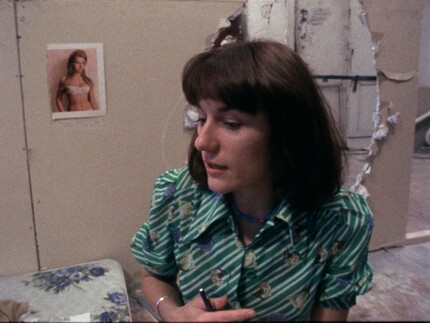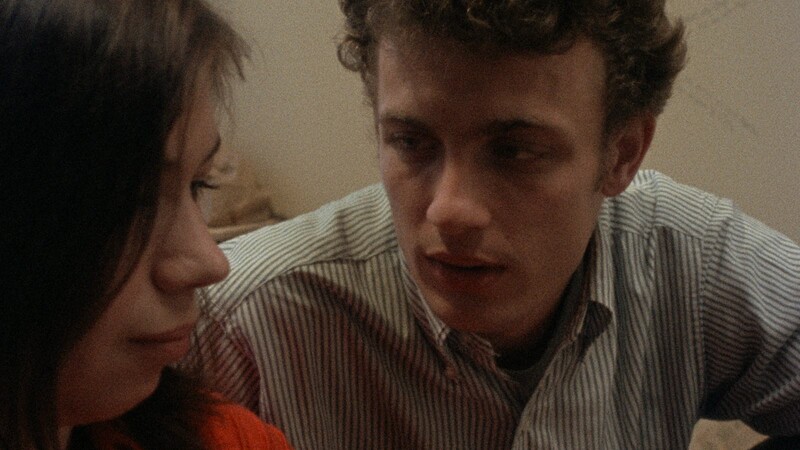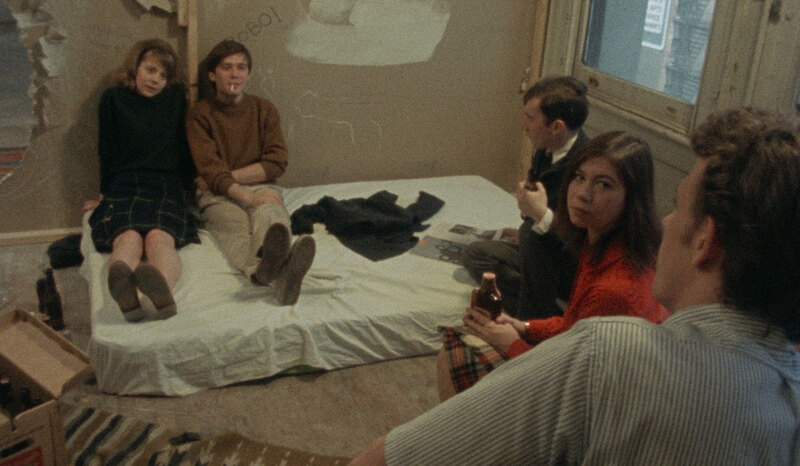NOT A PRETTY PICTURE Blu-ray Review: A Meta Examination of Deep Trauma

Martha Coolidge might be more known for her teen-focused comedies such as Valley Girl and The Prince and Me, but her work has always been forward-thinking in representations of women, and likely none of her films showcase this more than her 1976 dramatic feature debut. Not a Pretty Picture was not only revolutionary for its time, but remains one of the most raw and insightful films on rape.
Not a Pretty Picture is part documentary, about making a film that explores Coolidge's experience of date rape when she was young, and the story itself. 16-year-old Martha (Michele Maneti) is promised a fun weekend of sightseeing and parties in New York, with some school chums, including the slightly older Curly (Jim Carrington). What she gets, though, is just a few of them in a dilapatated warehouse with a case of beer; Curly coerces her into a private room and proceeds to rape her. She is all but abandoned by her friends, rumours spread by Curly after the fact make her out to be a slut, and her school blames her, wanting to force her out of her form, away from the only person who supports her, her roommate.
Even in 1976, rape was still considered something done by a stranger attacking a girl walking alone (and she would still get blamed); date rape was something whispered about in secret, and it wasn't until years later that we would come to understand that this was, in fact, the far more common occurance. Her experience with documentary filmmakering opened a window for Coolidge on how to manifest this topic through her own story, and confront a society still not willing to accept the hidden truth.
Utilizing improvisation techniques, unusual spaces, and close interaction with her performers, the film moves between the story, or reenactments, and Coolidge working with her actors so they can uncover character psychology and motivation. Given the sensitive nature of the topic, and that Maneti herself is also a rape survivor, this kind of intimate connection shared with the audience, forces the audience to engage on a much deeper level. We cannot dismiss the story as just a story, since we know it has happened to at least two people in front of us on screen.
It's fascinating (albeit not always in a pleasant way) to watch and listen to the discussions between Coolidge, Maneti, and Carrington, about how to act out the scene of the assault. Coolidge and Maneti discuss what happened to each of them in their respective assaults, how their assailants used coersive words and threats as much as some brute force, to the point where it would be easy. afterwards, to blame themselves, given how society treated victims (and still does). For Carrington, it's about recognizing how a guy might think he has permission to treat a woman this way, since men were told that women really don't mean no when they say it, or that a woman should just let him do what he wants, because his desire takes precedence over her reluctance.
The DIY spirit and intention makes this story feel all that more real. Anyone who has been the victim of an attack, sexual or otherwise, likely constantly questions what they could have done differently to prevent it - spoken more forcefully, walked down a different street - and yet what Coolidge is trying to show, is that really there wasn't anything that could have been done, since the attacker had made up their mind on their actions.
Some of the actors are professional, some not; some were already friends before this filmmaking, some are strangers. Yet since we have access to Coolidge's process, we can see how it affects not only her, but those around her, and what it means to act in such a story.
It also feels something of a counterpoint to the 'issue' films of the 1950s, which sought to teach sexual hygeine through stories of illicit sex and unwanted pregnancy. Instead, Coolidge shows us how women who are raped are truly treated by society, the fears of an unwanted pregnancy, and the lasting effects on the human psyche.
Special Features
Coolidge supervised and enthusiastically approves of the amazing 4K restoration, which maintains the 70s indie print film aesthetic while cleaning up the ravages of time and makign sure the colours and actors performances come alive.
There's a great interview with Coolidge and fellow indie filmmaker Allison Anders (Gas Food Lodging, Grace of My Heart); it's as much a conversation between friends and colleagues as it is a formal discussion, but given the nature of the film, it works much better, Coolidge talks about her initial desire to make a film about the then-still too often ignored reality of date rape and how its survivors were treated. She also talks about how she started making films, and working with her actors to help them understand the delicate subject, especially when it was often difficult to perform without trauma.
Almost a semi-introduction to the main feature, the inclusion of Coolidge's documentary about her grandmother, Old-Fashioned Woman, provides context both for the filmmaker's style, and her interest in the lives of girls and women. Her grandmother is indeed of a generation that she claims just was happy and accepted the roles in life that they were handed, as women, to be wives and mothers, even when it's clear that she had both academic and artistic talent. It's both an intimate, personal portrait and a mirror to the shift in society at this time period.
Molly Haskell provides an insightful historical context in her essay. noting how revolutionary the film was when released. Not only for confronting the subject of rape, especially date rape, as directly as it did, but how Coolidge was a part of a movement of women filmmakers who used personal experience and a more home movie aesthetic and documentary style to showcase these issues. She also places the film within Coolidge's later films, as an extension of her exploration and more intelligent portrayals of women characters.
Not a Pretty Picture
Director(s)
- Martha Coolidge
Writer(s)
- Martha Coolidge
Cast
- Reed Birney
- Jim Carrington
- John Fedinatz









